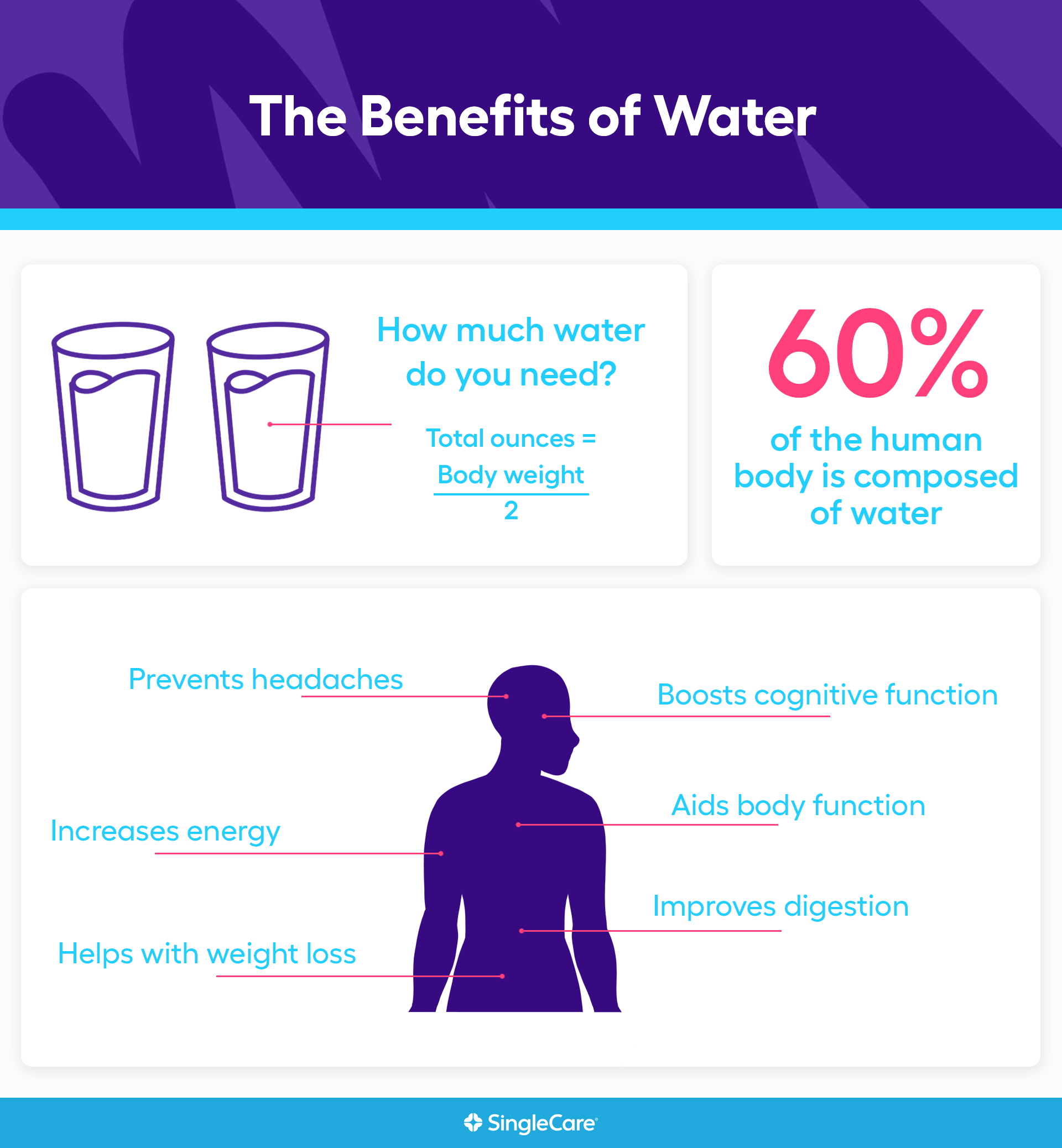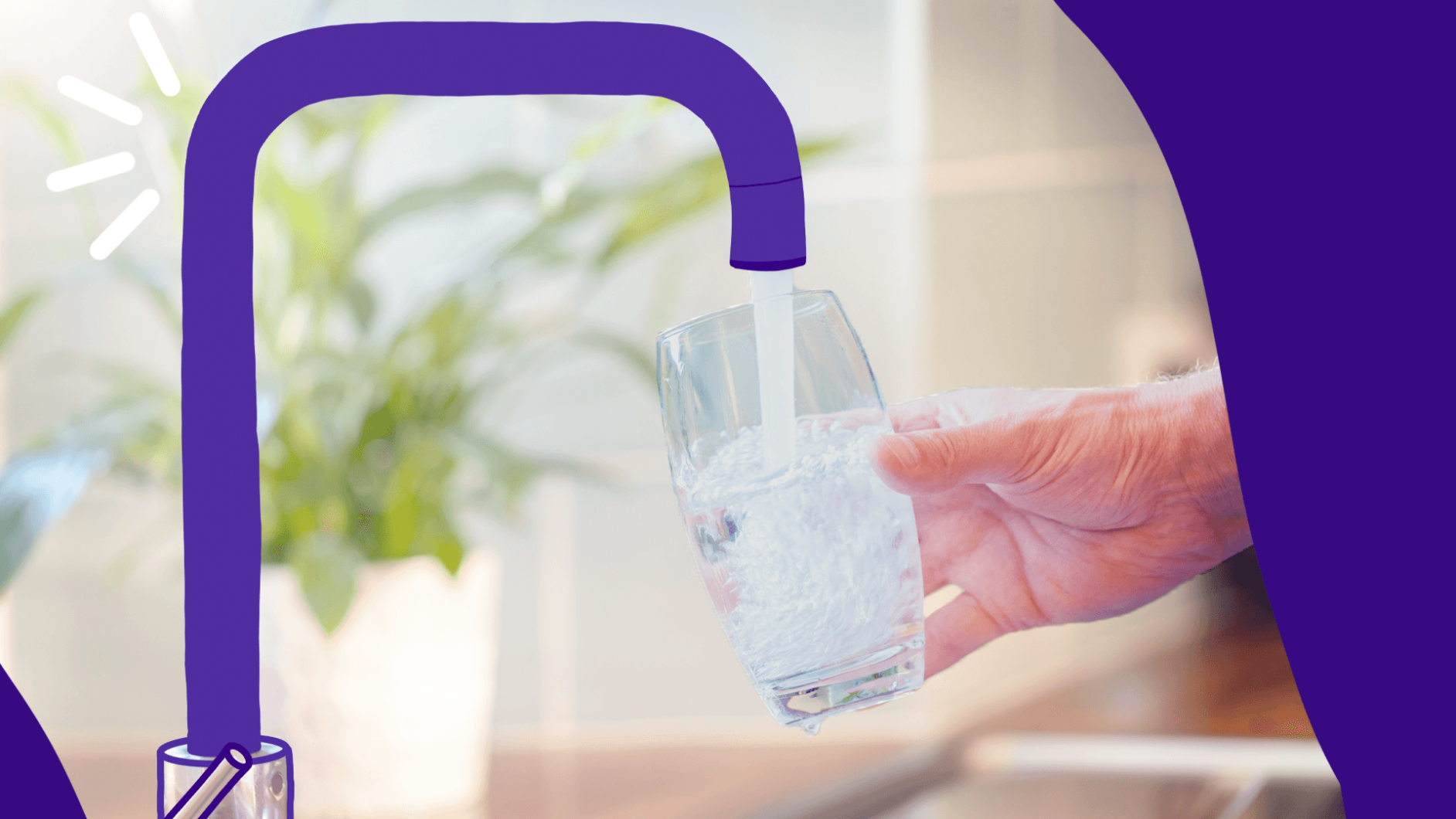Key takeaways
Drinking enough water is linked to healthier dietary choices and can aid in weight loss by increasing satiety and improving nutrient absorption.
Proper hydration is essential for the optimal functioning of the body’s systems, including the immune, cardiovascular, and nervous systems, and can prevent health issues like kidney stones and urinary tract infections.
Consuming adequate amounts of water boosts energy levels and cognitive function, preventing fatigue and brain fog.
Adequate water intake is crucial for preventing dehydration-related headaches and maintaining regular bowel movements.
If you reach for a can of soda when you’re thirsty, you might want to turn on the tap instead.
That’s because plain drinking water is one of the best ways to stay hydrated, according to the Centers for Disease Control (CDC). Up to 71% of adults, and over 50% of children in the U.S. don’t drink enough water. The human body is composed of up to 60% water, you can’t survive more than a couple days without it. Not consuming enough can have a dangerous impact on your health. Getting into the habit of regularly consuming water can have life-long positive effects. Learn more about all the health benefits of drinking water.

7 benefits of drinking water
1. You’ll eat healthier
The CDC found that U.S. adolescents who drink less water also tended to drink less milk and more sugary drinks, eat less fruits and vegetables and more fast food, and get less physical activity. In other words, when you’re drinking enough H2O daily, you make healthier dietary choices overall.
2. It could help you lose weight
By craving and choosing more nutritious foods, you may start to notice changes in your body. Drinking water has also been associated with increased feelings of satiety while eating less. That combination can lead to weight loss. Having a glass of water 30 minutes before a meal can aid in digestion. Then, drinking an hour after eating assists with nutrient absorption. In people with diabetes, having more fluid intake 15 to 20 minutes before meals may lead to reduced insulin requirements.
3. Your body functions better
“Being properly hydrated is crucial to staying healthy and maintaining the function of all of your body’s systems such as the immune system, cardiovascular system, nervous system, endocrine system, and musculoskeletal system,” says Tara Allen, a registered nurse and certified health coach, nutritionist, and personal trainer. Poor hydration can result in kidney stones, urinary tract infections, and a drop in blood pressure—that can even lead to fainting. “Proper hydration also helps to carry nutrients and oxygen to your cells and toxins out of your body,” explains Allen.
4. You’ll have more energy
Drinking water also helps you avoid becoming dehydrated. This occurs when you are losing or using more fluids than you are taking in, via sweat, breathing, urination, and defecation. Poor hydration can result in fatigue. When you don’t drink enough water, it can sap your energy levels.
5. You’ll think more clearly
Another side effect of too little water? Brain fog. Even mild dehydration can impair cognitive function. It may even make you feel confused, distracted, or cause memory lapses. Drinking more water can help your brain work the way it’s supposed to, and improve your mood.
6. It could prevent headaches
If you’ve ever experienced a hangover, then you know. Dehydration can lead to a pounding head. It can even trigger migraine.
“The first few symptoms might be very subtle and sometimes missed, including decreased urine that seems to be ‘darker’ or more ‘concentrated’ dry skin, sleepiness or fatigue, increased thirst, dry mouth, dizziness, and headaches,” says Pamela Lobo Moreno, MD, an internal medicine physician at Loma Linda University Health. “As the dehydration progresses, there can be confusion, rapid breathing, muscle pains and cramps, increased heart rate, decreased skin turgor, abdominal or chest pain, and even lethargy.”
Adequate water intake can prevent these symptoms—including debilitating headaches.
7. It may keep you regular
Low water consumption is linked to difficulty passing stool. Staying hydrated is the number one recommendation when it comes to home remedies for constipation and improving digestion. It can both prevent and relieve symptoms of this uncomfortable condition.
How much water do you need?
It depends on your age, weight, sex, and level of activity. Dr. Moreno says that the average adult should drink six to eight 8 ounce glasses of water a day; for kids or toddlers, that number drops to four to five cups of water a day. But that recommendation changes based on certain conditions and circumstances.
“If you are going to be outside and are sweating, or have been losing water through a cold, diarrhea, or exercise, you should increase the water intake to make up for the extra losses,” Dr. Moreno advises. “There is not a rule as it all depends on individual losses, but on average if you are exercising, you can drink three, 8 ounce glasses of water every 15 minutes of your workout. If you are outside on a hot day, you can take two to four extra 8 ounce glasses of water.” If you live at a high elevation, you will also need to consume more water to stay hydrated.
| Recommended daily water intake | |
| Adult men | 125 ounces |
| Adult women | 91 ounces |
| Pregnant women | 64 to 96 ounces |
| Boys (ages 10 – 18) | 81 to 112 ounces |
| Girls (ages 10 – 18) | 71 to 78 ounces |
| Children | The number of 8 ounce cups corresponding to age. For example, at age 5, a child needs five 8 ounce glasses, or 40 total ounces of water. |
| Athletes | Drink one ounce for every pound of body weight when exercising vigorously. For example, a 150 pound athlete would need 150 ounces daily. |
Consult with your healthcare provider to determine the appropriate amount of water for your lifestyle. As a general rule, divide your body weight in half and strive to get that number of ounces each day. Meaning, if you weigh 150 pounds, consuming 75 ounces of water should do the trick. If you rarely feel thirsty, and your urine is light yellow or colorless, those are two good signs that you’re getting enough.
Is it possible to drink too much water?
Most people are concerned about drinking too little water, but drinking too much can have dangerous health consequences. It can lead to a condition called hyponatremia, in which your kidneys can’t rid your body of water quickly enough, and the salt content of your blood becomes diluted. Sometimes called water intoxication, it can cause confusion, vomiting, and disorientation. In severe cases, it can even lead to brain swelling and death. Some people drink excessive water due to a disorder called psychogenic polydipsia, which requires medical intervention.
However, overhydration is uncommon in regular life. It occurs rarely, for athletes trying to avoid dehydration, or in combination with illegal drug use.
Where to get water
Plain water is optimal. A bonus? It has no calories. If you don’t really like water, you can flavor it with pieces of fruit or slices of citrus, suggests Dr. Moreno. You may try drinking unsweetened teas, coconut water, or broths. “You can also ‘eat your water,’” she says, “by consuming more fruits and vegetables that are rich in water, like watermelons, celery, strawberries, and cabbage.”
Parents may find it difficult to get younger kids to consume enough water. In addition to the hacks above, Dr. Moreno suggests “avoiding being outside on really hot days if unnecessary, making sure to remind them to drink water every 30 minutes to an hour, and offering the water even if they don’t ask. You can make it fun, have them eat ice pops made just of water and fruit, and if they are sick—even if they do not want to eat—make sure they drink milk, as milk helps hydrate, too.”
Also consider what medications you’re taking. Some meds can actually cause dehydration.
- About water and healthier drinks, Centers for Disease Control and Prevention
- Water intake, water balance, and the elusive daily water requirement, Nutrients (2018)
- Prevalence of inadequate hydration among US children and disparities by gender and race/ethnicity: National health and nutrition examination survey, 2009–2012
- American Journal of Public Health (2015)
- The water in you: Water and the human body, U.S. Geological Survey (2019)
- Water, hydration, and health, Nutrition Reviews (2011)
- Fast facts: Data on water consumption, Centers for Disease Control and Prevention
- Effect of pre-meal water consumption on energy intake and satiety in non-obese young adults,
- Clinical Nutrition Research (2018)
- Mild dehydration impairs cognitive performance and mood of men, British Journal of Nutrition (2011)
- The cognitive effects of proper hydration, Occupational Safety and Health Administration
- Constipation in older adults, Canadian Family Physician (2015)
- Dietary reference intakes (DRIs): Recommended dietary allowances and adequate intakes, total water and macronutrients, National Academy of Sciences (2011)




